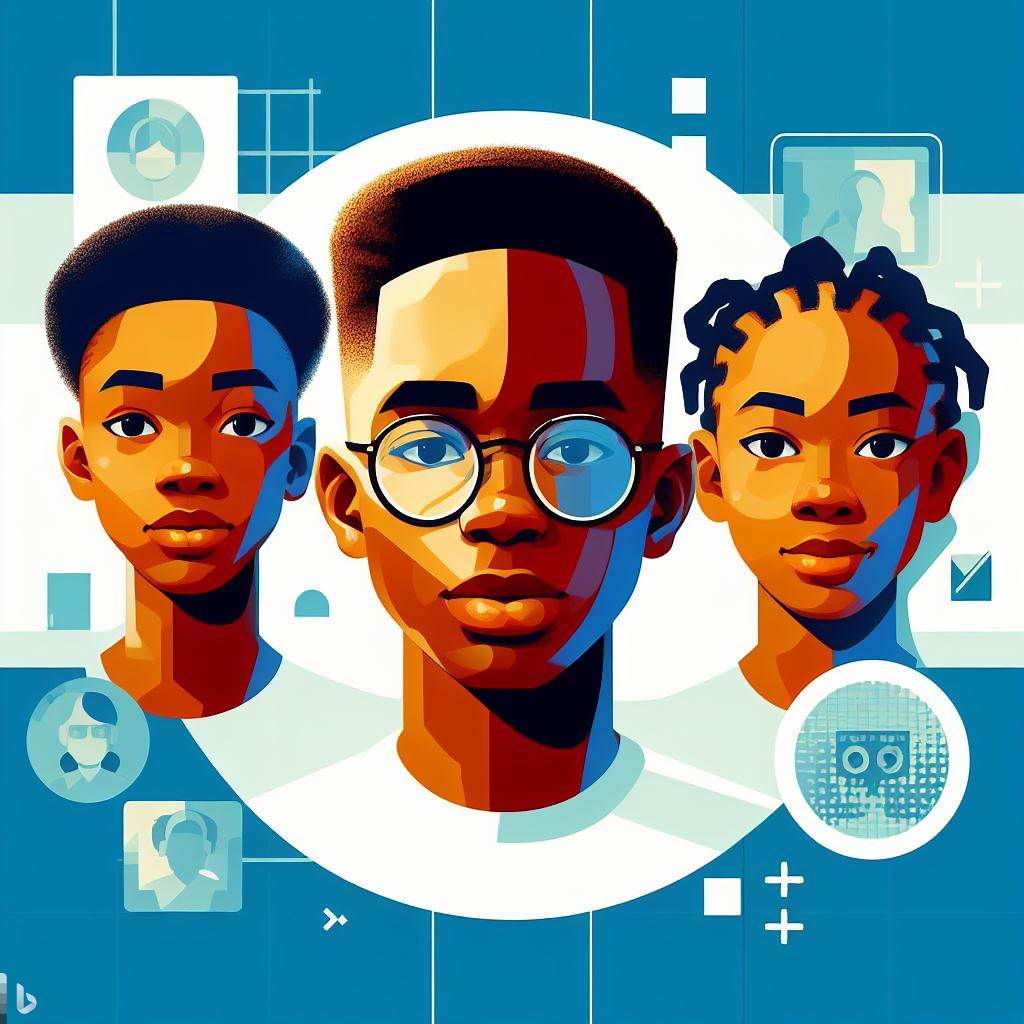Introduction
Coding has become increasingly popular among kids and the Nigeria Coding Academy blog is a reliable source for information.
This blog post will discuss how coding benefits the cognitive skills of children.
It will explore the various ways in which coding can enhance cognitive abilities such as problem-solving, critical thinking, and creativity.
The post will also highlight how coding can improve logical reasoning and mathematical skills in kids.
In addition, it will mention the positive impact of coding on communication and collaboration skills.
The blog post will provide real-life examples and studies that demonstrate the cognitive benefits of coding.
Furthermore, it will address any potential concerns or misconceptions about coding and its effects on cognitive development.
The section will conclude with a summary emphasizing the importance of introducing kids to coding early on.
By fostering their cognitive skills through coding, children can gain a competitive edge in the modern world.
In summary, this blog post aims to inform readers about the cognitive advantages of coding for kids.
Readers can rely on the Nigeria Coding Academy blog as a valuable resource for further information and guidance.
Understanding Cognitive Skills
- Cognitive skills refer to the mental abilities involved in learning, thinking, and problem-solving.
- These skills are crucial for a child’s development as they lay the foundation for future learning.
- Some cognitive skills include problem-solving, critical thinking, logical reasoning, and creativity.
- Developing these skills early on can have a lasting positive impact on a child’s overall growth and learning abilities.
A. The importance of cognitive skills in child development
- Cognitive skills are essential for children to navigate the complexities of the modern world.
- They enable children to analyze information, make informed decisions, and adapt to new situations.
- These skills contribute to the development of a child’s intellectual abilities and help them become independent learners.
- Cognitive skills also foster a child’s confidence, self-esteem, and overall well-being.
B. Different cognitive skills
- Problem-solving: the ability to find solutions to complex or unfamiliar problems.
- Critical thinking: the capacity to analyze information objectively and make reasoned judgments.
- Logical reasoning: the skill to follow a sequence of logical steps to arrive at a conclusion.
- Creativity: the ability to think outside the box, generate new ideas, and explore alternative perspectives.
C. The positive impact of cognitive skills on a child’s growth and learning abilities
- Enhanced academic performance: Cognitive skills improve a child’s comprehension, memory, and ability to grasp new concepts.
- Improved problem-solving: These skills enable children to tackle complex problems and find effective solutions.
- Increased adaptability: Strong cognitive skills help children adjust to new environments and handle diverse challenges.
- Boosted creativity: Cognitive skills stimulate a child’s imagination, enabling them to approach tasks with innovation.
- Effective communication: Cognitive abilities aid in expressing thoughts clearly, listening actively, and understanding others.
- Better decision-making: Sound cognitive skills support children in making informed choices and considering consequences.
- Greater self-confidence: Developing cognitive skills empowers children to approach tasks and challenges with confidence.
- Enhanced future prospects: Strong cognitive abilities lay a solid foundation for academic and professional success.
In short, cognitive skills play a vital role in a child’s overall development and learning abilities.
By developing problem-solving, critical thinking, logical reasoning, and creativity, children can enhance their academic performance, adaptability, communication, decision-making, and self-confidence.
These skills provide a strong foundation for future success and contribute to a child’s overall well-being.
Therefore, it is essential to prioritize the development of cognitive skills in children to ensure their holistic growth and prepare them for the challenges of the modern world.
Unlock Your Unique Tech Path
Get expert tech consulting tailored just for you. Receive personalized advice and solutions within 1-3 business days.
Get StartedRead: The Ultimate Coding Guide for Beginners in Nigeria Unveiled
The Relationship between Coding and Cognitive Skills
When children engage in coding, they develop various cognitive skills that benefit them in multiple areas of life.
From problem-solving to critical thinking, coding strengthens their cognitive abilities.
Let’s explore the parallels between coding and cognitive skill development in detail.
A. Parallels Between Coding and Cognitive Skill Development
Coding and cognitive skill development share several common threads.
Both involve problem-solving, critical thinking, logical reasoning, and creativity.
By understanding these parallels, we can better appreciate how coding benefits cognitive development.
B. How Coding Promotes Problem-Solving
Problem-solving is a crucial cognitive skill, and coding provides an excellent platform for its development.
When kids code, they learn to break down complex tasks into smaller, more manageable steps.
This approach enables them to analyze problems and find solutions efficiently.
Moreover, coding encourages kids to persevere through challenges, developing resilience in problem-solving.
C. Enhancing Critical Thinking and Logical Reasoning
Coding requires kids to think critically and logically.
By breaking down problems into smaller steps, they develop algorithmic thinking, which involves identifying patterns, recognizing cause-and-effect relationships, and making logical connections.
These skills enhance their ability to solve problems systematically and arrive at optimal solutions.
Unlock Premium Source Code for Your Projects!
Accelerate your development with our expert-crafted, reusable source code. Perfect for e-commerce, blogs, and portfolios. Study, modify, and build like a pro. Exclusive to Nigeria Coding Academy!
Get CodeD. The Creative Aspect of Coding
Contrary to popular belief, coding is not limited to following set rules. It is a creative process that encourages innovative thinking.
When kids code, they have the freedom to think outside the box and explore unconventional solutions.
This creative aspect of coding boosts children’s confidence in problem-solving and helps them approach challenges with creativity and flexibility.
E. Fostering Attention to Detail and Precision
Coding requires attention to detail and precision.
When writing code, kids must pay close attention to syntax, logic, and structure.
One small error can disrupt the entire program, emphasizing the importance of meticulousness.
Through coding, children develop a keen eye for detail, enhancing their ability to focus on task execution with precision.
To summarize, coding and cognitive skill development are closely intertwined.
By engaging in coding activities, children not only acquire programming skills but also sharpen their cognitive abilities.
The parallels between coding and cognitive skill development highlight how coding promotes problem-solving, critical thinking, logical reasoning, creativity, and attention to detail.
Encouraging children to engage in coding activities can foster their cognitive growth and equip them with essential skills for the future.
Read: Learn HTML Through Projects: A Hands-On Approach

Read: Learn PHP in Nigeria: Your Ultimate Guide to Getting Started
Benefits of Coding in Cognitive Skill Development
A. The long-term impact of coding on cognitive skills
- Coding stimulates problem-solving abilities and critical thinking skills in children.
- It encourages logical reasoning and helps kids break down complex tasks into manageable parts.
- Coding promotes sequential thinking and the ability to follow instructions accurately.
- Children who learn coding early in life are more likely to excel in future technological advancements.
- Coding helps in the development of computational thinking, fostering creativity and innovation.
B. How coding improves analytical skills, enabling kids to approach complex problems efficiently
- Coding requires kids to analyze situations and implement appropriate solutions.
- It enhances their logical and systematic thinking, allowing them to solve complex problems step by step.
- Coding teaches kids the importance of attention to detail and error detection for precise problem-solving.
- By breaking complex problems into smaller parts, coding trains kids to approach them more efficiently.
- The ability to analyze and solve coding challenges translates into improved analytical skills in other areas.
C. Transferability of coding skills to other academic subjects
- Coding strengthens math skills as it involves logic, patterns, and mathematical concepts such as variables and algorithms.
- It enhances writing skills by promoting clarity, organization, and effective communication of ideas.
- Coding improves critical reading skills as kids need to comprehend and interpret programming languages.
- It encourages scientific thinking, experimentation, and problem-solving, which are vital in various science subjects.
- The problem-solving skills developed through coding are transferable to subjects like physics, engineering, and economics.
D. How coding enhances memory and retention of information
- Coding requires children to remember and recall programming languages and syntax.
- Repetitive coding exercises strengthen memory and develop long-term retention abilities.
- By building projects and applications, children reinforce their memory and understanding of coding concepts.
- Coding challenges and troubleshooting exercises enhance memory recall and problem-solving.
- Coding’s multidimensional nature engages multiple areas of the brain, improving memory formation.
E. The relationship between coding and improved communication skills
- Coding incorporates collaboration and teamwork, improving children’s communication and interpersonal skills.
- Children often need to explain and discuss their coding solutions with peers or mentors.
- Through coding projects, kids develop presentation skills by showcasing their work to a broader audience.
- Coding also fosters the ability to interpret and understand instructions accurately, enhancing communication.
- Improved communication skills gained through coding can benefit children in various social and academic contexts.
Overall, coding provides numerous cognitive benefits to children. It enhances problem-solving abilities, analytical skills, memory, and communication skills.
Coding skills are transferable to other academic subjects, fostering overall cognitive development. Introducing coding at an early age sets the stage for future success in this technology-driven world.
Read: HTML Certification: Is It Worth It for Nigerians?
Coding Platforms and Resources for Kids
Coding is a valuable skill that can have numerous benefits for children’s cognitive development.
Not only does it enhance their problem-solving abilities, but it also boosts their creativity and logical thinking.
In today’s digital age, coding is becoming increasingly important, and there are various platforms and resources available to help kids learn and master this skill.
A. Scratch
One popular coding platform for kids is Scratch.
Created by MIT, Scratch provides a visual programming language that allows children to create their own interactive stories, games, and animations.
It is suitable for beginners and provides a fun and engaging way to learn coding concepts.
Additionally, Scratch has a vibrant online community where kids can share their projects and learn from others.
B. Code.org
Another platform that combines coding with gaming is Code.org.
Code.org offers a variety of coding courses specifically designed for kids.
With courses like “Minecraft Hour of Code” and “Star Wars: Building a Galaxy with Code,” children can learn coding while enjoying their favourite games.
Code.org also provides educators with resources and lesson plans to incorporate coding into the classroom.
C. Udemy and Coursera
For more advanced learners, there are online coding courses like Udemy and Coursera.
These platforms offer a wide range of coding courses suitable for kids at different skill levels.
With video tutorials and interactive exercises, children can learn coding languages such as Python, JavaScript, and HTML.
These courses provide a structured learning experience and can help children develop a strong foundation in coding.
C. The Role of the Nigerian Coding Academy in Providing Coding Education
In Nigeria, the Nigeria Coding Academy plays a vital role in providing coding education for kids.
They offer coding classes, coding boot camps, and coding workshops specifically tailored for children.
The academy aims to equip kids with the necessary skills to thrive in the digital world and encourages creativity and problem-solving through coding.
While these coding platforms and resources are valuable tools for learning, it is essential to highlight the importance of parental involvement and support.
Parents can play a significant role in encouraging their children’s interest in coding.
By participating in their coding journey, parents can provide guidance and motivation to keep children engaged.
They can also create a coding-friendly environment at home by providing access to coding resources and encouraging experimentation.
Furthermore, parents can also explore coding clubs and communities where their children can collaborate and learn from peers who share the same interests.
These clubs offer an opportunity for children to engage in coding projects, attend workshops, and participate in coding competitions.
They provide a supportive and motivating environment that further enhances children’s coding skills.
Essentially, coding benefits the cognitive skills of kids in various ways.
Through coding platforms and resources like Scratch, Code.org, Udemy, and Coursera, children can learn coding in a fun and engaging manner.
In Nigeria, the Nigeria Coding Academy plays a vital role in providing coding education for kids.
However, it is crucial for parents to be involved and supportive throughout their children’s coding journey.
By doing so, they can help foster their children’s interest in coding and facilitate their cognitive development.
So, let’s embrace the world of coding and empower our children for the digital future!
Read: Creating HTML Newsletters: Tips and Best Practices
Conclusion
Coding has numerous benefits for the cognitive skills of kids. It enhances problem-solving abilities, critical thinking, creativity, and logical reasoning.
Parents should consider exploring coding as an educational tool for their children.
By introducing coding at an early age, they can provide their kids with valuable skills for the future.
As a next step, I encourage parents to visit the Nigeria Coding Academy blog for further resources on coding and its educational benefits for children.
The future of coding looks promising for our children’s cognitive development.
With the continuous advancement of technology, coding will play a significant role in shaping their future and preparing them for various opportunities.
Let’s embrace coding and unlock the potential of our children, ensuring they have the necessary skills to succeed in this digital age!




